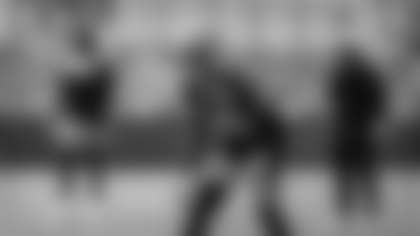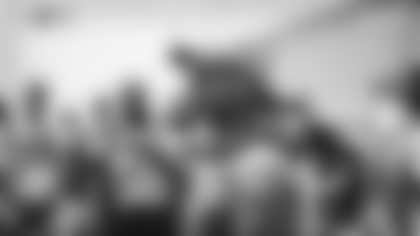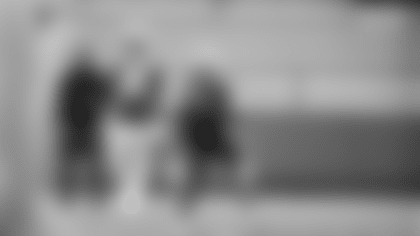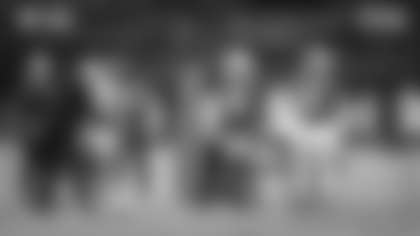Lee: I can't understand why Jerry Kramer is not in the Pro Football Hall of Fame. What is it going to take for Jerry to get in? He was one of the leading forces of the power sweep during the Lombardi era, and his efforts as an offensive guard should make him worthy of entrance into the Hall. - Bill (Reading, Penn.)
Bill, I am in complete agreement. Like you, I cannot comprehend why Number 64 has not been elected to the Pro Football Hall of Fame -- and decades ago. He was, after all, the only guard named to the National Football League's 50th Anniversary Team chosen by the Hall of Fame Selection Committee in 1969.
Beyond that Jerry Kramer was a six-time all-pro selection during his 11-year playing career and was further honored when elected to the Super Bowl Silver Anniversary Team in 1990 by the nation's pro football fans.
En route, Jerry helped the Packers forge the greatest dynasty in NFL history, one which saw them sweep to five championships in seven years during the 1960s and climax that extraordinary reign by winning the first two Super Bowls.
Additionally Jerry retired from the game following the 1968 season as the highest scoring offensive lineman in team history with 177 points after kicking 29 field goals and 90 extra points -- three of those field goals providing the margin of victory as Jerry kicked the Packers past the New York Giants 16-7 in the 1962 NFL Championship Game at Gotham's historic Yankee Stadium.
I just found an old book -- "Distant Replay" by Jerry Kramer and Dick Schaap and re-read it. There were about 40 players listed from Super Bowl I. I know Lombardi, Nitschke and Jordan are deceased. How many of the others are deceased? - Alyce (LaCrosse, Wis.)
Alyce, as far as I can determine, seven players from the Super Bowl I team -- along with their head coach -- are deceased. In addition to Nitschke and Jordan, they include Lionel Aldridge, Bob Brown, LeeRoy Caffey, Tommy Joe Crutcher and Ron Kostelnik,
Three of Lombardi's assistant coaches at Super Bowl I -- Phil Bengtson,
John "Red" Cochran and Norb Hecker -- also have passed away.
Lee -- Do you feel like players from the 1980's like Lynn Dickey, Paul Coffman, John Anderson and Mike Douglass are underappreciated because their teams were not very good overall? Dickey had an extraordinary season in 1983 with 4458 yards (team record) and 32 touchdowns and couldn't even get into the Pro Bowl. He also led the Packers to 49 points in a half vs. Tampa Bay, a feat that absolutely deserves more attention in Packers lore. I feel as though these players don't get the recognition they are due, and younger fans should know more about these great players . - Red (Queensbury)
Red, I think you may have hit upon the answer yourself by suggesting that Lynn Dickey, Mike Douglass and John Anderson, among others, were not formally recognized for their considerable football skills because the teams they played on "were not very good overall."
Whether fair or not, only one of the three was ever named to an all-pro team during his NFL career -- Douglass by Pro Football Weekly in 1982 and by Sports Illustrated in 1983.
Yet former Packer Larry McCarren, a two-time Pro Bowl selection at center (1982 and 1983), who snapped to Dickey for six seasons, has described him as "the finest long-passer I have ever seen," as well as a strong leader.
Unfortunately for Lynn, however, the Packers compiled a 52-66-2 record while he was under center from 1976-77 and 1978-85 and made the playoffs only once during that season.
Anderson and Douglass also made significant contributions over their playing careers but endured a similar fate. John remains the leading tackler in team annals with 1,020 total stops over 12 seasons and is tied with Pro Football Hall of Famer Ray Nitschke in team history for most interceptions by a linebacker with 25, noteworthy accomplishments. And Douglass ranks third on the team's all-time list in career tackles with 967.
But the Packers were 78-102-4 during Anderson's 12 seasons (1978-89) while Douglass and his teammates settled for a 55-63-3 record over his eight seasons (1978-85).
Where did the "Packers Fight Song" originate from? - Jim (Green Bay, Wis.)
Jim, a man named Eric Karll, a Milwaukee resident, composed the team's fight song officially entitled "Go! You Packers Go!" back in 1931. At the time it was published by the "Green Bay Packers Corporation" and the sheet music sold for 35 cents a copy.
At one time the most-heard version was recorded by the Lawrence Welk Band, according to Lovell Ives, longtime former director of the Packers Band.
Ives, by the way, disclosed that he uses "several different versions" of the song when he and his fellow musicians with the Packers' musical "Six Packs" tour the Lambeau Field parking lot playing appropriate music prior to home games. One, he said, is "a jazz band arrangement" that he wrote.
Dear Mr. Remmel, I have been a life-long Packers fan and have always wondered why Bobby Dillon is not in the Pro Football Hall of Fame. He has more career picks then Willie Wood and Herb Adderley. Was this because he was on such poor teams during his whole career? I also know that he was on Lombardi's first team and then was gone after that. He didn't seem like he had that long of a career. Thank you for shedding some light on this for me. - John (Stanley, Wis.)
I think you may have answered your own question, John. As good as he was -- and Bobby Dillon was a consistent standout at the safety position -- throughout his eight NFL seasons, I'm afraid that having been on "such poor teams during his whole career" prevented him from receiving the recognition he so richly deserved. He played on only one winning team during those nine seasons -- Vince Lombardi's first Green Bay team in 1959 -- and, overall, on teams with a collective record of just 33 wins compared to 61 losses and 2 ties.
Had Bobby begun -- rather than ended -- his career under Lombardi, I am confident he would have been a strong candidate for Hall of Fame recognition or certainly for perennial Pro Bowl recognition.
Lee, I read not too long ago about a movie that was going to be made based on the Ice Bowl game. Have you or the Packer organization heard anything further on this? Do you know when it might be out in theaters? - Richard (Steamboat Springs, Colo.)
Richard, I have had some preliminary discussions with people presumably working on the project. Most recently HBO has expressed an interest in doing a "special" on the legendary contest but had no indication of a timetable with respect to when a finished product might become available.
What's Brett Favre going to do when he decides to take on off-field activities? Fish, golf professionally or coach? - Mark (Hayward)
Mark, as far as I have been able to determine, Brett has never indicated what he will do in life after football. But undoubtedly fishing and golf will be prominent in his overall agenda. Though his late father, Irvin, was a coach before him, I'm not so sure Brett would be willing to spend the time away from his family that coaching inevitably would require of him.
Lee, why have the Packers discontinued their biannual tradition of playing one preseason game at University of Wisconsin-Madison's Camp Randall Stadium? When did this tradition start? Also will they ever consider hosting a scrimmage or preseason game at Milwaukee's Miller Park? I realize why they don't play regular season games in Milwaukee anymore, but a scrimmage or preseason game closer to home would be nice to see. - Dave (Racine, Wis.)
The "tradition" of playing a pre-season game at Camp Randall Stadium has been discontinued, in part, because the original purpose no longer applies. At the time the series was launched, Packers President Bob Harlan--at the request of Athletic Director Elroy Hirsch (and later his successor, Pat Richter) -- agreed to play a preseason game at Camp Randall annually to help the UW's football program. It was then having serious financial difficulties, not only to get out of debt but become solvent.
Subsequently, Barry Alvarez arrived in 1990 and began to turn the program completely around, winning an imposing collection of Big Ten titles and Rose Bowls, and the University no longer needed assistance from the Packers.
Additionally, the National Football League has taken over the scheduling of preseason games in the interim and requested that the Packers play two games at Lambeau Field annually along with two on the road, thus in effect eliminating the possibility of playing an annual game at Camp Randall.
The tradition of playing a preseason game in Madison, incidentally, started in 1986 and continued through 1999. In the latter year, the Packers' game against the Denver Broncos (Aug.23) drew 78,184 fans, the largest crowd ever to see the Packers play a game in the state of Wisconsin.
As to staging a scrimmage of a pre-season game at Miller Park in Milwaukee, I am not sure that it would be "physically" feasible.
Lee, what did Curly Lambeau go on to do following his coaching career with the Packers? I seem to remember that he coached another team and applied for the job of general manager of the Packers several years later. I also remember hearing that he married a model and had some showbiz connections. Am I right on any of these issues? - Jack (Whitewater, Wis.)
Jack, Curly left the Packers following the 1949 season to become vice president, head coach and general manager of the then Chicago Cardinals. He was with the Big Red for the 1950 (5-7-0) and '61 (3-9-0) seasons before he and the Cardinals came to the parting of the ways.
Lambeau then was signed on as head coach of the Washington Redskins by Owner George Preston Marshall in 1952. After a 4-8-0 season that year, Curly led the Redskins to a 6-5-1 record in 1953, his 33rd and final season as an NFL head coach.
He returned to the coaching field in 1955 for a last hurrah when he signed on to tutor the College All-Stars in the then annual summer classic that pitted the year's graduating college stars against the reigning champions of the NFL
Curly proceeded to upset Paul Brown and the Cleveland Browns in 1955 in the first of those All-Star contests, 30-28, but lost each of the next two years with the All-Stars falling to the New York Giants (22-12) in his final game as a head coach in 1957.
From the personal perspective, you accurately heard that he married a "showbiz" person at one time. He wed the former Susan Johnson, a former "Miss California," the second time around and the former Grace Garland, the ex-wife of two Hollywood film directors, when he took unto himself a third wife.
As to Lambeau's relationship with Lombardi, Vince made it clear that he had little use for Curly or his lifestyle.
From the coaching perspective, Curly won six NFL championships and 226 games in 33 seasons as a head coach -- a much long career than Lombardi enjoyed. Only three coaches in pro football history have won more games (Don Shula, George Halas and Tom Landry).
However, having said that, I would be inclined to consider Lombardi the better coach, based on his impressive .739 winning percentage (96-36), second highest in NFL history. He also led the Packers to five NFL championships in seven seasons in the '60s, an accomplishment without precedent or parallel in the annals of professional football.
But I would also remind you that had it not been for Earl Louis Lambeau, there would have been no Green Bay Packers and, thus, no Vince Lombardi in Titletown.
Continuing an association with the team that is more than 55 years old, Lee Remmel was named the first official Team Historian of the Green Bay Packers in February 2004. The former *Green Bay Press-Gazette reporter and Packers public relations director, Remmel will write regular columns for Packers.com as part of his new assignment.
In addition to those articles, Remmel will answer fan questions in a monthly Q&A column. To submit a question to Remmel, click here. *














